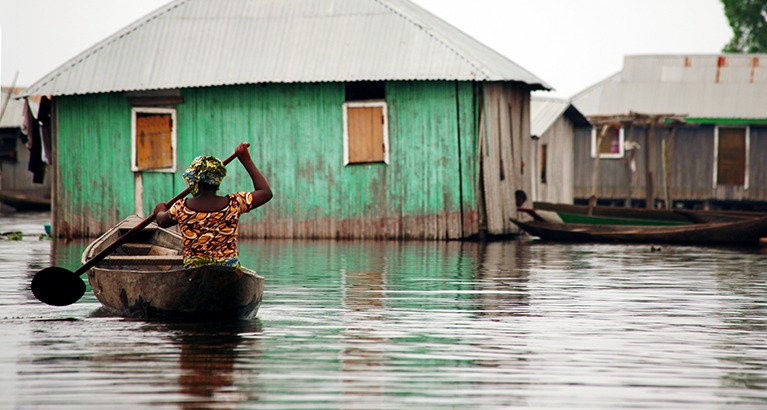
Global gross domestic product (GDP) per capita could decline by up to 24% by 2100 under high-emission climate scenarios of the Intergovernmental Panel on Climate Change (IPCC) without significant mitigation and adaptation efforts, says a new study co-authored by Kamiar Mohaddes of Cambridge Judge Business School.
These income losses vary significantly across 174 countries in the study’s sample, but cold-weather and richer countries would not escape the GDP reductions caused by climate change, says the study, which is part of the Cambridge Working Papers in Economics series.
The paper – entitled “Rising Temperatures, Melting Incomes: Country-Specific Macroeconomic Effects of Climate Scenarios” – is co-authored by Kamiar Mohaddes, Associate Professor in Economics and Policy at Cambridge Judge Business School, and Mehdi Raissi, Deputy Division Chief at the International Monetary Fund and a Fellow at the climaTRACES Lab, University of Cambridge.
No country or sector is immune to climate change
Kamiar is Co-Director of the interdisciplinary climaTRACES Lab. The new paper complements earlier research by Kamiar and colleagues that looked at the macroeconomic effects of climate change across countries, regions, and different economic sectors: unchecked global warming could decrease long-term growth, by reducing labour productivity caused by diminished physical and cognitive performances as well as increased mortality and morbidity, slowing capital accumulation through permanent or long-term damage to capital and land or an increase in the rate of capital depreciation, and lower total factor productivity (TFP) growth, which compares production outputs and inputs. All sectors of the economy ranging from agriculture to retail to manufacturing could be significantly harmed by climate change.
The new paper co-authored by Kamiar makes clear that while adaptation to climate-change impacts (through measures such as climate resilient public infrastructure, disaster risk management, and farmers switching to more drought-resistant crops) shrinks income losses, mitigation (or reducing greenhouse gas emissions) is needed to combat the long-term growth effects of climate change, and particularly in the largest emitters.
No country is immune from the impact of climate change if greenhouse gas emissions are not curtailed.
“Urgent action is needed to address climate change and protect economies from further income losses,” the paper concludes.
“We estimate country-specific annual per-capita GDP losses from global warming using a wide range of IPCC climate scenarios under different mitigation, adaptation, and climate variability assumptions. We show that no country is immune from the impact of climate change if greenhouse gas emissions are not curtailed,” said Kamiar.
“Countries situated in hotter climates and those classified as low income likely face disproportionately higher income losses. However, countries in colder climates are not spared from the effects of climate change. Our findings emphasise the importance of climate change mitigation and adaptation policies to minimise these negative income effects.”
Kamiar adds that the paper’s estimates are conservative, given that most models are unable to account for non-market damages such as food insecurity and conflicts, as well as tipping points.
Potential effect of climate change on various countries
Among the country-by-country estimates: the US, UK, France, South Africa and Vietnam are expected to sustain income losses of about 24%, 13%, 16%, 27% and 20%, respectively, under a high-emissions scenario and with extremely slow adaptation efforts. More ambitious adaptation efforts lower these adverse impacts substantially but cannot eliminate them entirely. Abiding by the Paris Agreement temperature goals reduces these losses to almost zero.
Near-term versus long-term effects of climate change
The new paper builds on a 2021 study that links deviations of temperature (weather) from its 30-year rolling moving averages (climate) to GDP per capita growth, and shows that a persistent increase in temperature above its historical norm for an extended period of time (climate change) is associated with lower economic growth in the long run. This suggests that a temporary temperature shock will only have near-term growth effects, but climate change, by shifting the long-term average and variability of weather, could impact an economy’s ability to grow in the long-term. Since there are no pathways to a scenario in which temperatures remain constant, the study uses a baseline under which temperature in each country rises according to its historical trend of 1960-2014. It then compares the per capita GDP impact of temperature increases under different climate scenarios over the period 2015-2100 relative to this baseline, while also examining the role of climate variability.
Featured faculty
Kamiar Mohaddes
Associate Professor in Economics and Policy
Deputy Director of the Cambridge Executive MBA Programme
Dr Kamiar Mohaddes is also a Co-Director of the climaTRACES Lab, an interdisciplinary research initiative at the University of Cambridge focusing on climate, nature, and sustainability research.
Featured research
Mohaddes, K. and Raissi, M. (2024) “Rising temperatures, melting incomes: country-specific macroeconomic effects of climate scenarios.” Cambridge Working Papers in Economics, no.2429
Related content
Kahn, M.E., Mohaddes, K., Ng, R.N.C., Pesaran, M.H., Raissi, M. and Yang, J.-C. (2021) “Long-term macroeconomic effects of climate change: a cross-country analysis.” Energy Economics
Mohaddes, K., Ng, R.N.C., Pesaran, M.H., Raissi, M., Yang, J.-C. (2023) “Climate change and economic activity: evidence from US states.” Oxford Open Economics





